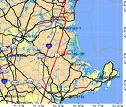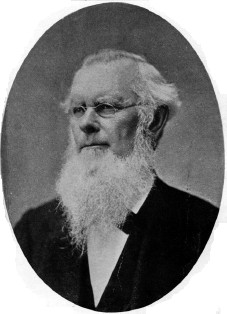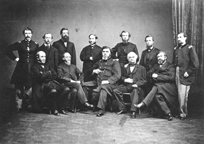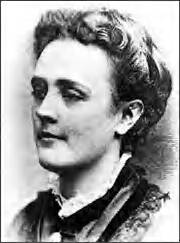The Jewett Family and Homeopathy
March 29, 2008
 The Jewett
family
is a numerous American family which was founded by two English brothers
who came to this country in 1638 and settled at Rowley, Massachusetts,
in the following
year.
The older brother was Maximilian, and the younger, Joseph Jewett, and it
is from these two that all the Jewetts in the United States descend.
The Jewett
family
is a numerous American family which was founded by two English brothers
who came to this country in 1638 and settled at Rowley, Massachusetts,
in the following
year.
The older brother was Maximilian, and the younger, Joseph Jewett, and it
is from these two that all the Jewetts in the United States descend.
The Jewett family had contributed numerous ministers, educators, doctors, politicians and judges, three homeopaths, a librarian, a publisher and one influential American novelist.
 **Adams Jewett
**1807-1875
brother of Hibbert was a doctor and an abolitionist and a member of the
Montgomery County Medical Society
whose Order of Society in 1901 stated ’The homeopathic calf and the old
lion and the osteopathic fatling lie down together in the medical fold
and there is
peace‘..
**Adams Jewett
**1807-1875
brother of Hibbert was a doctor and an abolitionist and a member of the
Montgomery County Medical Society
whose Order of Society in 1901 stated ’The homeopathic calf and the old
lion and the osteopathic fatling lie down together in the medical fold
and there is
peace‘..
Charles Coffin Jewett was born in 1816 in Lebanon, Maine. He began his library career at Andover Theological Seminary, where he prepared his first catalog.
In 1841, he became the librarian of Brown University. He extensively rearranged that library, and created a subject catalog of its contents. He became Librarian and Assistant Secretary of the Smithsonian Institution in1848, and published a survey of U.S. libraries. He also started mechanical duplication of individual catalog entries.
Jewett left the Smithsonian after being relieved of his position due to some scandal. He went on to become Superintendent of the Boston Public Library in 1858, where he remained until his retirement in 1865.
 Fredrick Jewett was a Brooklyn
doctor who was Sanitary Inspector and Superintendent of Contagious
Diseases.
Fredrick Jewett was a Brooklyn
doctor who was Sanitary Inspector and Superintendent of Contagious
Diseases.
 **Hibberd
Jewett
**1799-1870
brother of Adams was a doctor and an abolitionist and a member of the
Montgomery County Medical Society
whose Order of Society in 1901 stated ’The homeopathic calf and the old
lion and the osteopathic fatling lie down together in the medical fold
and there is
peace‘.
**Hibberd
Jewett
**1799-1870
brother of Adams was a doctor and an abolitionist and a member of the
Montgomery County Medical Society
whose Order of Society in 1901 stated ’The homeopathic calf and the old
lion and the osteopathic fatling lie down together in the medical fold
and there is
peace‘.
 John P Jewett was a
Boston publisher who
published
Uncle Tom’s Cabin by
Harriet Beecher
Stowe,
poems
by John Greenleaf
Whittier
and Harriet Kezia
Hunt.
John P Jewett was a
Boston publisher who
published
Uncle Tom’s Cabin by
Harriet Beecher
Stowe,
poems
by John Greenleaf
Whittier
and Harriet Kezia
Hunt.
John R Jewett of Lyons, Mich., was born in Saybrook, Middlesex county, Conn., on March 5th, 1809. His father was an attorney and counselor ; his grandfather was a captain in the Revolutionary Army, and while a prisoner was killed in resisting a robbery of his personal property. His mother was a daughter of Dr. Elisha Mather, of the above named place.
In 1819, Dr. Jewett’s father moved to Springfield, O. ; he then attended a select school at Urbana, and afterward the High School at Granby Corner, where, in connection with the more common branches, he also studied the languages.
In 1829, he commenced the study of medicine at Ann Arbor, Mich., in the office of his cousin, Dr. David Lord. In the winter of 1831-‘32, he attended medical lectures at Cincinnati, O., and the following year received license to practice as a physician from the Territorial Medical Society.
In 1838, his attention was called to the claims of homœopathy by the perusal of a pamphlet written by Dr. Constantine Hering, and also by a communication from Dr. Gideon Humphrey of Philadelphia.
In 1846, he began practice as a homœopath, and, in the winter of 1851, attended lectures at the Western Homœopathic College at Cleveland, O., where he received his degree.
In 1848, he married Miss Mary L. Snyder. He was one of the first to introduce the new system in the State of Michigan, and has now as much practice as the precarious state of his health will allow him to look after.
John R. Jewett began to practice homœopathy in 1846 in Lyons, Ionia county, farther west than his fellow practitioners. In 1832 he received a territorial license and had practiced the old school system at Lyons. In 1838 his attention was called to homœopathy by the address of Dr. Constantine Hering, published in ”A Concise View of Homœopathy“…
 Milo P.
Jewett
Cottage Hill Seminary was founded by Lydia Booth and closed at her death
in 1854; purchased and reopened by Milo P. Jewett in 1856; Jewett later
served as the first president of
Vassar; in
1867 he moved to Milwaukee and became a trustee of Milwaukee Female
College
under the direction of Catharine
Beecher.
Milo P.
Jewett
Cottage Hill Seminary was founded by Lydia Booth and closed at her death
in 1854; purchased and reopened by Milo P. Jewett in 1856; Jewett later
served as the first president of
Vassar; in
1867 he moved to Milwaukee and became a trustee of Milwaukee Female
College
under the direction of Catharine
Beecher.
 Pliny A. Jewett was
Professor of
Obstetrics
at the Knight Hospital, New
Haven.
Pliny A. Jewett was
Professor of
Obstetrics
at the Knight Hospital, New
Haven.
 Sarah Orne
Jewett
1849 – 1909 was an American writer and
novelist,
Swedenborgian (based on
the work of Emanuel
Swedenborg), and
member of the Boston intelligentsia and a supporter of homeopathy.
Sarah Orne
Jewett
1849 – 1909 was an American writer and
novelist,
Swedenborgian (based on
the work of Emanuel
Swedenborg), and
member of the Boston intelligentsia and a supporter of homeopathy.
Jewett knew all of the important people of her time and made frequent trips to Europe.
Jewett published her first important story in the Atlantic Monthly at age 19 and became fast friends with writer Annie Fields and her husband, publisher James T. Fields, editor of the Atlantic Monthly.
After the sudden death of James T. Fields in 1881, Jewett and Annie Fields lived together for the rest of Jewett’s life (Annie Fields died in 1915) in what was then termed a ”Boston marriage.”
Living in Boston, Jewett had many neighbours who were homeopaths or advocates of homeopathy, including Julia Ward Howe, Elizabeth Cady Stanton, Susan B. Anthony, Lucretia Coffin Mott, Clemence Sophia Lozier, Elizabeth Stuart Phelps and Louisa May Alcott.
The Boston Guide Book clearly illustrates what a small world Boston was at this time and what an eclectic group of reformers resided there!
Jewett was a close friend of John Greenleaf Whittier, and Harriet Beecher Stowe (who Jewett acknowledged as an inspiration for her own writing and whose brother Henry Ward Beecher was a patient of homeopath Dr. Jewett (?which one)) and Laura Towne. Nathaniel Hawthorne and his family often visited Sarah Orne Jewett.
Jewett was influenced by the Spiritualist tradition. Her character Mrs. Todd in her Dunnett Landing tales was a feminist and a herbalist rooted in the Spiritualist and homeopathic ‘deep folk roots’ embraced by the reformers of her age, and who portrayed homeopathic doctors as title characters in her writings.
Jewett was also influenced by Ralph Waldo Emerson, Henry David Thoreau, Elizabeth Stuart Phelps and Victoria Woodhull.
Jewett would also have known all of the homeopaths and homeopathic supporters who frequented Elizabeth Palmer Peabody’s Foreign Library: Wendell Phillips, Henry Ward Beecher, Susan B Anthony, Julia Ward Howe, Josephine S Griffing, Theodore Dwight Weld and the Grimke Sisters, William Lloyd Garrison, Parker Pillsbury, Theodore Parker, Clemence Lozier, Charlotte Denman Lozier, Gerrit Smith, Wendell Phillips, Frederick Douglass, Julia Ward Howe, William Lloyd Garrison, Hamilton Wilcox, Emily Howard Jennings Stowe, Susan B Anthony, Clara Barton, Phoebe Ann (Coffin) Hanaford, Moncure Daniel Conway, Elizabeth Peabody, Margaret Fuller, William Ellery Channing, Ellery Channing, George and Sophia Ripley, Orestes Brownson, James Freeman Clarke, John Sullivan Dwight, Paulina Kellogg Wright Davis, Ednah Dow Cheney, the Bartlett’s, the Wesselhoefts, Thomas Wentworth Higginson, Gerrit Smith, Frederick Douglass, Hamilton Wilcox, Emily Howard Jennings Stowe, and many others.
Most of these people were either homeopaths or supporters of homeopathy, and all circulated through Elizabeth Peabody’s Foreign Library and Ticknor and Fields’ Parnassus Corner.
Named for her paternal grandfather and grandmother, Theodora Sarah Orne Jewett was the second of three girls born to Theodore Herman and Caroline Frances Perry Jewett in the New England village of South Berwick, Maine. Descending on both sides from pre-Revolutionary families that had built up comfortable incomes from shipbuilding and seafaring, she was the daughter and granddaughter of physicians.
As a child Jewett wished to become a doctor herself. Poor health thwarted that ambition even as it encouraged her close relationship with her father, who took her with him on medical calls to build up her strength. These trips through rural and small-town Maine provided her, by her own account, with material for her writing throughout her career.
Upon graduation from Berwick Academy in 1865, Jewett began writing short fiction. She also published poetry, literature for children, and two novels, one of which, A Country Doctor, shows a young woman choosing to become a physician rather than marry.
But her true gift was short narrative. As she wrote to Horace Scudder, the assistant editor of The Atlantic Monthly, in 1873:
"But I don't believe I could write a long story as you and Mr. Howells advise me in this last letter.... The story would have no plot." She explained: "I could write you entertaining letters perhaps, from some desirable house where I was in most charming company, but I couldn't make a story about it," and she ended by lamenting: "What shall be done with such a girl? For I wish to keep on writing, and to do the very best I can."
Jewett was an American fiction writer contemporary with Mark Twain, grew up in South Berwick, Maine, where she lived much of her life. After establishing herself as a short story writer for adults and young people, she formed a close friendship with Annie Fields, wife of the publisher James T. Fields…
With Mrs. Fields, Jewett formed friendships with a number of the major artists and intellectuals of her time, including Madame Thérèse Blanc, Willa Cather, Mary Ellen Chase, William Dean Howells, Henry James, Alice G. Howe, Rudyard Kipling, Rose Lamb, Alice Meynell, Harriet P. Spofford, Harriet Beecher Stowe, Celia Thaxter, Mrs. Humphrey Ward, Sarah Wyman Whitman, and John Greenleaf Whittier.
Jewett’s early life was very much like the one she sketches in her novel A Country Doctor; Jewett and Nan Prince share the characteristics of an independent childhood followed by an unconventional womanhood…
Jewett was raised with tons of books in and around her home; she was virtually fed on words. It seems only natural that she should be drawn to write. Her mother was Caroline Frances and her father was Theodore Herman Jewett (23).
On Sept 3, 1902, both Sarah was in a serious a carriage wreck when their horse slipped on a loose rock and stumbled. This accident effectively ended Jewett’s writing career.
Both Sarah and her sister Rebecca were thrown from the carriage, but while Rebecca was relatively unhurt, Sarah suffered a concussion and some damage to the neck.
Speculation is that perhaps she had a cracked vertebra, but it was never officially diagnosed. She had pain, dizzy spells, memory loss and lost the ability to concentrate for the seven years until she died, of unrelated causes.
The senior Jewett was not a young man when he married, and through industry, thrift and business acumen he had acquired a competence which enabled him to retire from the business of stock-raising soon after his son was born.
In 1888 he removed to Waltham, Massachusetts, where he made his home for the next four years. There young Jewett began his schooling. But the love of the land was strong and when the son was seven the family returned to Maine, settling upon a small farm in Norway.
There Stephen, Jr., attended the Norway Liberal Institute, and later went to Kents Hill for a year. At the age of sixteen he had begun to teach school. When he had completed his preparation work he entered Clark University, Worcester, Massachusetts.
He was influenced to this choice through his acquaintance with a remarkable man, George Howe, an Alumnus of Tufts, who had become greatly interested in natural history, and who had founded the Sidney Smith Science Club, named in honor of a Yale professor who visited Norway in his vacations and greatly stimulated local interest in natural science.
These early influences and associations were potent factors in determining the trend of young Jewett’s thought and interest which have not changed during the intervening years.
One of America’s most famous educators and psychologists, G. Stanley Hall was then president of Clark University, which had remarkable departments of psychology, biology and allied sciences, and the deeper Mr. Jewett delved into these subjects the stronger became his interest.
In 1904 he was graduated with the degree of Bachelor of Arts. This was followed by a year of post-graduate work, largely on yeast, for which he received the degree of Master of Arts.
During his last at year at Clark, Dr. Jewett lived in the home of a Worcester physician, and this contact awakened an interest in human beings and a desire to relate his scientific work to them in a practical way.
So he took up the study of medicine in the New York Homeopathic College, from which he was graduated with the usual degree in 1908. For the latter three years of his course, he lived at the Metropolitan Hospital, working in the laboratories and walking the wards with the physicians, thereby gaining a broad practical experience of inestimable value.
After that, Dr. Jewett had charge of the outdoor department of the Flower Hospital for a while, and went from there to Buffalo, where he engaged in general practice as a member of the staff of the Millard Fillmore Hospital.
But all this while he had no intention of remaining in general practice longer then necessary to lay a broad foundation of experiences, as the basis for the practice of his specialty.
Furthermore, as might be expected of one with Dr. Jewett’s cultural and technical background, he could not commit himself wholly, or even largely, to any “ology” or “pathy”; but, recognizing what was sound in every school of medical or mental therapeutics, could seize upon the good that justified itself pragmatically and make discriminating use of it.
Even at that time he knew that to achieve much that was worth while it would be necessary to locate in a large city affording ample opportunities for research and practice. Accordingly he located in New York City in 1915 and set out to complete studies at Columbia University, he was also connected with the staff on one of the local sanitoriums.
From 1816 to 1922 he was identified with Bellevue and allied hospitals as attending physician in the psychiatric service. During all this time he as, of course, also engaged in private practice.
When the United States entered the World War, Dr. Jewett sought to enter the service, but it was held that he could not be spared from the valuable work in which he was already engaged.
Upon severing his connections with Bellevue Hospital, he became affiliated with the New York State Hospital Commission in the capacity of medical examiner in the Bureau of Deportation. His duties involved the examination of all aliens seeking entrance into this country. During all these years he was pursuing the most advanced of technical studies in his specialty at Columbia.
The result of all these deep studies and unusually broad experience was the conviction in Dr. Jewett’s mind that most of the psychiatric problems that confront society have their beginnings in childhood, and that the roots of nearly all maladjustment to society could be traced to the infantile period when, to an unfavorable heredity were added many times malnutrition and a bad environment; and that prevention work, if it is to be accomplish anything worth while, must be begun at an early age.
So he turned his attention more largely to mental hygiene and became psychiatrist in 1922 to the Bureau of Children’s Guidance, which was a five-year experimental program instituted by the Commonwealth Fund for New York. He served in that connection for five years, and at the same time was attending psychiatrist to the United States Veterans’ Hospital No. 81.
Since 1922 he has also been lecturer on hygiene at the New York School of Social Work. During his long service in Bellevue the immense number of psychopathic, alcoholic and criminal cases with which he dealt convinced him fully that social service could contribute enormously to an understanding of the problems that confront the sociologist.
Thus he was brought to give much attention to field of social medicine and is now tremendously interested in the broader aspects of social work. Dr. Jewett is now director of the advisory bureau of the Hudson Guild in New York, and is trying to bring about an entirely different approach to social problems from that generally employed in the past—that is, prevention of crime; trying to teach parents how to rear children so that they will be able to meet the demands of society and thus prevent crime and delinquency.
He is also consulting psychiatrist and director of research at the Berkshire Industrial Farm, Canaan, New York.
William E Jewett of Adrian, Mich., was born in Langerfield, Oneida county, N. Y, December 8th, 1842. His grandfather, Jonathan Jewett, moved to Langerfield with his parents at the age of eight, and resided on the same farm for nearly eighty-four years. He died June 11th, 1872, at the advanced age of ninety.
Dr. Jewett was educated at Grand River Institute, Austinburg, O., taking the full classic and scientific courses. In September, 1864, he began studying medicine with E. A. Manger, of Waterville, N. Y. Afterwards his studies were conducted by Dr. C. C. Olmstead, of Painesville, O.
During the winters of 1865-‘66, he attended lectures at the Homœopathic College, Cleveland, O. The following winter he went to New York, and, after attending the lectures of the New York Homœopathic Medical College, Dr. Jewett graduated in the spring of 1867.
The following winter he spent in the hospitals of that city, reaping much advantage from the experience obtained. In 1868, he located at Constantine, St. Joseph county, Mich, where he married Miss Kittie A. Root.
He soon succeeded in establishing a large and lucrative country practice, and made many life-long friends. After the birth of his two children, in 1870 and ‘72, he concluded to remove to Adrian, Mich., where he located in January of the latter year. Here his success has been most flattering, and his popularity is such that among his numerous patrons his name has become a household word.
A large and constantly increasing practice requires an assiduous devotion to the duties of his profession, in which he has already attained an enviable reputation.
